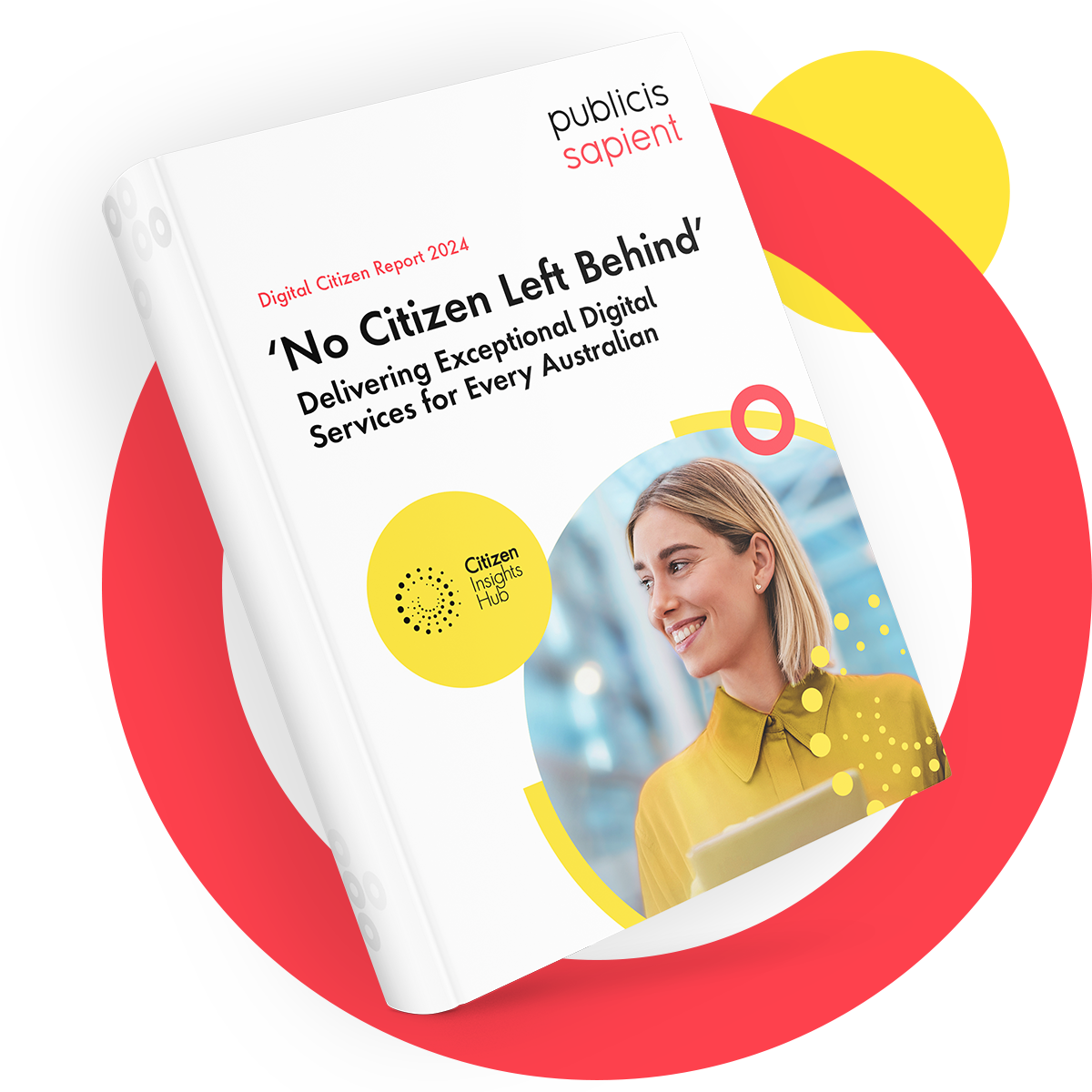What issue can we solve for you?
Type in your prompt above or try one of these suggestions
Suggested Prompt


Media Release
Cost of living crisis widening the digital divide for government services: Publicis Sapient Digital Citizen Report 2024
SYDNEY, 10 September 2024 – The number of Australians suffering financial hardship has surged by 85% in the past year, with lower-income households not using online government services available to them compared to higher-income households, according to the latest Publicis Sapient Digital Citizen Report 2024.
The third edition of the annual report, "No Citizen Left Behind" - Delivering Exceptional Digital Services for Every Australian, analysed responses from more than 5,000 participants across Australia to examine how people engage with governments through digital services.
The report reveals that a third (33%) of households earning less than $100k struggled to find, use or understand online government services, compared to 23% of households with higher incomes. This disparity was also borne out in other parts of the research, with a roughly 10% gap between higher and lower earners who used myGovID and digital wallets.
Government life-event services are a clear success story, with a 93% satisfaction rate among users. But the survey found that not everyone is taking advantage. There was lower engagement with digital services among the unemployed (16 points lower than employed citizens), lower-income households (11-point disparity) and those without university education (11-point disparity).
Concerningly, citizens on lower incomes have a noticeably worse experience of online government services than higher earners. While this isn’t an issue with the quality of services overall – 93% of users are satisfied – it does indicate that experiences may be harder to navigate for those under financial stress.
Steven Metzmacher, VP and Industry Lead, Public Sector at Publicis Sapient ANZ said: "The third edition of our landmark survey reveals that Government digital services are clearly effective with the vast majority of Australians who engage with online services being satisfied. There is, however, a growing digital divide which needs to be addressed. More needs to be done to increase adoption and reach sections of the public to ensure the services benefit all Australians, in particular those that need them the most."
The rise and role of AI in government services
The majority of Australians are supportive of the government using Artificial Intelligence (AI) to improve services, with 55% in favour of "extensive usage". Support for AI usage was especially high among under-45s (65%), high-income households (62%), and those who are already satisfied with a government service following a life-event (65%).
Australians also express a need for reassurance about risk management and clear governance, with 94% having concerns about AI and 92% wanting government regulation of AI. Nearly half (46%) of respondents want full transparency into the code behind the AI. This desire was higher among some of the most concerned groups, such as those with recent mental health struggles (52%) and those with precarious finances (56%).
"Australians are broadly satisfied and supportive of the work that the government is doing. There are clearly areas for improvement which the government should continue to pursue to build a stronger, simpler and more accessible digital government for everyone"
Steven Metzmacher , VP and Industry Lead, Public Sector at Publicis Sapient ANZ
Building trust vital to increase service adoption
Data security and privacy are also rising concerns, with 52% of Australians losing trust in the government around these issues. There was also an 11% rise of Australians more concerned about data privacy this year (48%) compared to 37% in 2023.
The decline in trust is especially sharp among younger citizens, with 59% of under-45s losing trust in the government’s ability to protect personal data in recent years. Those in a precarious financial situation are also less likely to trust the government with their data.
"When citizens worry about their data privacy and security, it dampens their enthusiasm for digital services and can slow down adoption rates. Security, privacy and data governance are foundational to the government’s digital agenda - and clear, reassuring communication about safety measures is just as critical," Metzmacher said.

Please find the link to download the full report:
Methodology
Research for the Publicis Sapient Digital Citizen Report 2024 was conducted online in February 2024 and involved 5,061 participants across Australia from a broad range of demographic groups, reflective of the country's population.
Respondents' demographic: Age - Gen Z (18-28), Millennial (29-44), Gen X (45 - 64), Boomer (65-79) and Builders (80+). Minority classification in respondent demographics is a combination of groups that identify either as a minority ethnicity/race, having a minority cultural background or belonging to a minority religion.
About Publicis Sapient
Publicis Sapient is a digital business transformation company. We partner with global organisations to help them create and sustain competitive advantage in a world that is increasingly digital. We operate through our expert SPEED – Strategy, Product, Experience, Engineering and Data & AI – capabilities, which combined with our culture of curiosity and deep industry knowledge, enable us to deliver meaningful impact to our clients’ businesses through reimagining the products and experiences their customers truly value. Our agile, data-driven approach equips our clients’ businesses for change, making digital the core of how they think and what they do. Publicis Sapient is the digital business transformation hub of Publicis Groupe with 20,000 people and over 50 offices worldwide. For more information, visit publicissapient.com.



